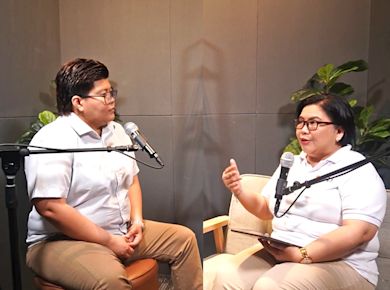Topics covered
- Published: 9 July 2025
- Updated: 15 July 2025
That exciting email has landed in your inbox: a university interview invitation! A mix of excitement and nerves is totally normal. This stage in the admissions process is your chance to shine, to go beyond your application, and to show the university what makes you the perfect fit. Universities use these interviews to get to know you as an individual, assessing your personality, passion, and overall suitability for their academic community.
To help you ace this important step, consider this your comprehensive guide. We'll provide practical strategies and tips to help you effectively prepare for your interview and boost your chances of securing your dream university spot. Let's get started!
Understanding the interview format
University interviews aren't one-size-fits-all, so it's crucial to understand the different formats you might encounter.
Some are in-person, allowing for a more traditional interaction, while others are virtual, conducted via video conferencing. You might also face a panel interview, where you'll be interviewed by several faculty members, or a more informal interview, which can feel more like a conversation. Each format has potential differences in structure and expectations. For instance, a panel interview may require you to address multiple interviewers, while a virtual interview demands strong online communication skills.
To be fully prepared, researching the specific format used by your target universities is key. Check their websites, contact the admissions office, or even reach out to current students for insights. Knowing what to expect will significantly reduce your anxiety and help you tailor your preparation.
Join the IDP student community
Connect with peers and student ambassadors to hear real experiences, tips, and advice about studying abroad.

Standing out from the crowd
Your university interview is your opportunity to showcase what makes you unique. Beyond your academic achievements, universities want to see your passion, your drive, and your potential. Here's how to stand out:
Showcase your passion: Demonstrate your genuine interest in your chosen field of study. Talk about what excites you, what questions you're exploring, and what you hope to achieve.
Articulate your goals: Clearly explain your career goals and aspirations. How does this programme fit into your long-term vision? Where do you see yourself in the future?
Demonstrate genuine interest: Go beyond surface-level knowledge. Research the university and programme thoroughly. Mention specific faculty members, research projects, or opportunities that align with your interests. Use university rankings as a starting point, but prepare to delve deeper into the programme's specifics.
Remember, universities are looking for students who are not only academically capable but also passionate, motivated, and a good fit for their community.
Review and reflect
Before your admission interview, take some time for review and reflection. This is your chance to reconnect with the application you've already submitted and prepare to articulate your journey.
Revisit your application: Refresh your memory on your personal statement and the details of the course information. Immerse yourself again in the story you told about yourself. This will help you align your answers, ensuring consistency and authenticity throughout the interview. Think of it as reacquainting yourself with the narrative you've already presented, so you can speak to it confidently and with clarity.
Reflect on your journey: Think about your academic and personal experiences. What key skills and achievements have you developed? What challenges have you overcome? Identify the moments that have shaped you and demonstrate your suitability for the programme. Prepare to discuss these experiences in a compelling way, highlighting their relevance to your chosen field.
Anticipate and prepare
Preparation is key to a successful university interview. See it as creating a roadmap for your conversation, ensuring you're ready to navigate any question that comes your way.
Plan your responses: Anticipate common uni interview questions. What are they likely to ask about your motivations, your experiences, and your future goals? Prepare thoughtful answers that showcase them. Consider how you can best articulate your qualities and why you're a strong candidate.
Prepare examples: Don't just tell them; show them! Prepare specific examples and anecdotes to illustrate your points and demonstrate your abilities. Instead of simply stating you're a good team player, describe a particular situation where you excelled in a team project. This will help the interviewer truly understand your capabilities.
Subject mastery
Demonstrating a strong understanding of your chosen subject is essential. It shows your genuine interest and intellectual curiosity, qualities that universities highly value.
Know your subject: Deepen your knowledge of the chosen subject and related areas. Go beyond the basics and be prepared to discuss key concepts, theories, and relevant research. For example, if you're applying for a business course, be ready to discuss current economic trends, marketing strategies, or business case studies.
Stay updated: Keep yourself current on recent developments and trends in your field of study. Follow industry news, read research articles, and stay informed about the latest advancements. For example, if you're applying for a technology-related course, be aware of emerging technologies and the latest innovations. This shows your commitment to the field and your proactive approach to learning.
Practice and polish
Practice makes perfect! Imagine this as rehearsing for a performance, ensuring you're confident and polished on the big day.
Mock interviews: Simulate the interview experience by practising with a friend, family member, or mentor. This will help you get comfortable with the format, reduce anxiety, and receive valuable feedback.
Refine your responses: Based on feedback and practice, refine your answers for clarity, conciseness, and impact. Focus on delivering your message effectively and engagingly.
Dress for success
Your appearance matters. It's about showing respect for the occasion and projecting confidence in yourself, demonstrating that you know the importance of the interview and are taking it seriously.
Dress appropriately: Choose attire that presents a professional and confident image. Think about what you would wear to a job interview in a professional setting. Avoid overly casual clothing, such as jeans, t-shirts, or athletic wear. Opt for clean, pressed clothing that fits you well. Consider the university culture and the specific department you're interviewing with. Some departments or universities may have a more formal atmosphere than others.
Consider the context: Dress accordingly for the specific context of the interview, whether it's formal or informal. If it's a virtual interview, ensure your background is tidy and professional. Pay attention to your lighting, camera angle, and the environment visible in the background. Even though you're not in person, your visual presentation still contributes to the overall impression you make.
Be punctual and prepare
Respect their time and show you're organised and ready to make a positive impression.
Arrive early: Punctuality is crucial. Aim to arrive at least 15-20 minutes before your scheduled interview time. This allows you to find the location, use the restroom, and take a few deep breaths, minimising unnecessary stress and allowing you to settle in.
Organise your documents: Bring copies of relevant documents, such as resumes, transcripts, or portfolios, to the admission interview. Have them neatly organised and easily accessible. Consider placing them in a professional-looking folder or binder.
Relax and shine
Manage your nerves and let your personality shine! Remember, this is your opportunity to connect with the interviewer and show them who you are.
Manage anxiety: Use techniques like deep breathing exercises, visualisation, and positive self-talk to manageinterview anxiety. Focus on your strengths and remember that the interviewer wants to get to know the real you.
Project confidence: Maintain a confident posture, make eye contact (if comfortable), and smile. Show your enthusiasm and let your personality come through.
Get free help with your university interview preparation
Acing a university interview is within your reach! Remember, preparation, practice, and confidence are your allies. View the admission interview as an opportunity to showcase your strengths, your enthusiasm, and what makes you the ideal fit for their university. With the right approach and a positive mindset, you can shine and secure your place at your dream university.
Feeling a bit unsure about where to start? There’s support you can find for every step of the way, including preparing for your university interview.
As the global leader in international education placement & services, IDP has experienced counsellors who provide personalised guidance to help you navigate the admissions process confidently. Your education advisor can offer valuable insights into what universities are looking for, help you refine your answers, and give preparation tips to equip you with that extra edge as you plan to study overseas.
You can see IDP as your friendly partner in this journey who is on your side to help you put your best foot forward.
Get tailored assistance throughout your journey, from university applications and navigating the complexities of your interview preparation to admissions and even visa processes and accommodation. Take the next step toward getting accepted to your dream university by booking a counselling session with IDP today.
One account for all your study abroad needs
Create your profile and unlock a wide array of features including personalised recommendations, fast-tracked applications and much more.











